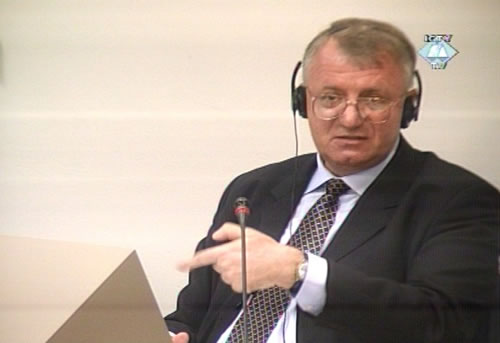Home
PROSECUTION OFFERS A COMPUTER COURSE FOR SESELJ
The Office of the Prosecutor wants the Trial Chamber to order Vojislav Seselj to accept its evidence in electronic form or, alternatively, to release it from the obligation to disclose statements sought by the accused.
 Vojislav Seselj in the courtroom
Vojislav Seselj in the courtroom In its response to one of the demands contained in Vojislav Seselj's Motion no. 30, the Office of the Prosecutor has offered to organize a computer and Internet training course for the accused.
In Motion no. 30 (link for faximil of the Motion is below this text), Seselj, among other things, demands that "all statements of all witnesses in all cases [that mention his name] in any context, in the course of an interview conducted by a prosecutor or testifying before a trial chamber be immediately disclosed" to him.
The Office of the Prosecutor considers Seselj's request legitimate to the extent that the disclosure of such statements does not pose a threat to the safety of victims and witnesses or to the confidentiality of the information received from so-called sensitive sources. The prosecution is prepared to undertake a search of its databases looking for statements that mention Seselj, estimating that there may be about 1,000 such statements over 6,000 to 7,000 pages.
Before embarking on this lengthy and costly project, the prosecution wants the Trial Chamber to order the accused to accept the material in the same form in which it is disclosed to all other accused, i.e., in electronic form--either on CD or DVD—and not on paper or video tape. The prosecution further asks that the Chamber be "satisfied that the accused is prepared to comply with the order" or else to "release the prosecution from the obligation" to disclose the material he seeks.
The Office of the Prosecutor is prepared to search its databases only for statements of witnesses who have not yet testified or who have testified in closed session. Transcripts of public testimonies are in the public domain--available on the Internet--and the Office of the Prosecutor – as it states in its response – does not intend to take on the role of Seselj's defense counsel and search for material that is generally available.
The prosecution believes that by his stubborn refusal to use a computer and access evidence in electronic form, the accused is jeopardizing his right to a fair and expeditious trial; prosecutors say it is in the interest of justice to make Seselj change his attitude.
For its part, the prosecution is ready to assist by organizing a brief computer and Internet course for Seselj.
